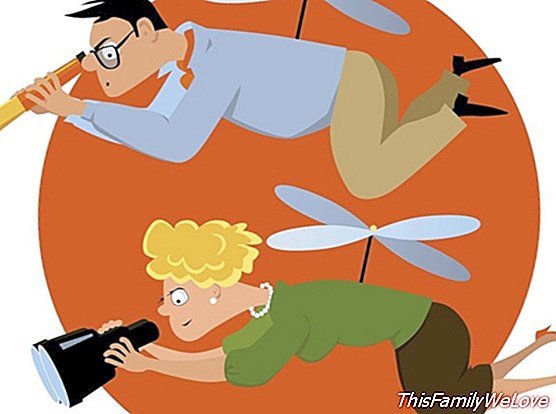Types of hyper-parents: these are the helicopter parents, tiger mothers, secretary parents ...

The helicopter parents, the parents roller or snow plows, depending on the terrain and the geographical location, parents manager, mother tiger, parents bodyguards or the parents sandwich are some of the types of hyper-parents that the new hyperpaternity has generated and that Eva Millet has classified in her book "Hyperpaternity From the 'furniture' model to the 'altar' model.
Hyperpaternity takes various forms depending on the relationship of parents with their children and is a current trend, which has nothing to do with the parenting model of our parents or grandparents. "We are all more hyper-parents than our parents were, but there are degrees and a variety of ways to exercise it," says Eva Millet.
The parents helicopter
The classic hyper-parents would be the helicopter parents. The helicopter would be the father that flies over the lives of the children: "pending of all their movements and needs"The term" father helicopter "first appeared in 1969 in the office of a child psychologist who was very surprised when a patient told him that he was tired of his mother flying over him like a helicopter. grace this image and wrote the term mother helicopter for the first time.
Parents roller or snow plow
Depending on the geographical location, the parents of roller or snow plow are those who prepare the way of the children, "paving it by system". Instead of preparing the children for the road, they eliminate all the difficulties of the way to the children, that is, as steamrollers they pave the way for them to go through life without traumas or frustrations
The tiger mothers
The tiger moms start from an Asian inspired model, they are the most demanding and look for perfection in their children. The term is epitomized by a Chinese-American writer who wrote a book about tiger breeding, which consists of being very close to the child and strictly to be and do what she wants. This type of experiment usually ends badly.
Parents secretary or agenda
They are the ones who act personal assistant of the children: they organize the agenda, the backpack, they organize them and they do their homework, they take the WhatApp groups from the school ...
Parents sandwich
They personalize a more discreet type of hyperpaternity, but they abound a lot in Spain and in the Latin countries and they are all those parents, mothers, grandparents and grandmothers who persecute their children or their grandchildren throughout the park with the sandwich in his hand to eat or at least bite while they are still playing.
Parents bodyguards
Always on the defensive, the bodyguard parents are those superprotectors who take care of the physical integrity of their children to the maximum, do not allow them to be touched, and also emotional, that is, they get upset if the teachers reprimand them in class or a classmate. he says something that they do not consider opportune and they take letters in the subject if someone criticizes his son.
The parents butler
Pleasing and always solicitous, are those that assist their children in all tasks. The model of parents butler is the one that brings the backpack to their children, they bring a glass of water to the bed, they get up to satisfy their desires in any situation so that they do not ...
How to avoid becoming a hyper father
The hyperpaternity is a model of parenting that emerged in the United States and that is characterized by the constant supervision and overprotection of the children as well as in the systematic resolution of their problems. Hyperpaternity has turned children into the kings of the house and in the parents' obsession to provide them with all the necessary means so that they have a better future. For this reason, hyperparents have the idea that you have to give your children all kinds of experiences and academic knowledge to "succeed" in life.
However, we can not forget the anxiety and the doubts that hyperparents feel in the upbringing of children and the consequences, still little measurable, of this type of education. To avoid becoming a hyper-father, Eva Millet recommends putting the underparenting. And it is that raising "super children" is not sustainable neither for parents nor for children. To practice underparenting is to be clear that we can not educate our children just for success, since children have to be happy in the first place.
Although exercised with the best purpose, the truth is that hyperpaternity is ignoring the development of emotional skills as important as autonomy, creating dependent children, the resistance to frustration, creating impatient children unable to overcome the obstacles or difficulties of life, the effort, because the parents give it all done, and free time because full of extracurricular activities they barely have time to play.
In this way, the childhood of the children of the hyper-parents is becoming a sort of training camp, with the stress generated by the agendas without gaps for one of the most important activities of the children: the game. The underparenting aims to stop parents from being so aware of the wishes of their children, giving priority to needs, and respecting their playing time. Eva Millet concludes "let's be happy again and do nothing, listen and value the individuality of each child".
Marisol Nuevo Espín




